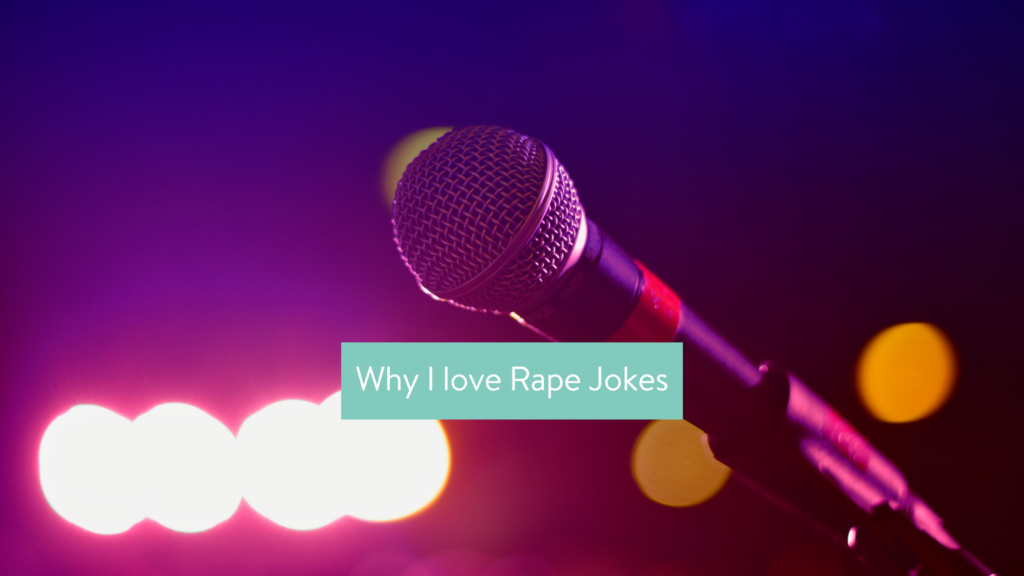Why I love Rape Jokes

Growing up, Cameron Esposito (she/they) thought that sexual assault would be exactly like it is on TV. She has a great joke about it: “It’s the opening of SVU. And there’s this, like, guy. He’s got a cleaver, a bloody cleaver! He’s covered head to toe in mud! Says ‘Dick Wolf’ right here. I see that guy and I’m like, ‘Olivia, that’s the fucking guy!!’” Insert wild laughter and me Googling where to buy shirts with Cameron’s face on it.
Rape Jokes, the comedy special where Cameron tells this joke, turned me into a comedian. When I first saw it in 2018, it was my senior year of high school. I was taking a break from comedy to focus on “real theater.” I wanted to create dramatic work that made people think and nod and say, “Hmm,” ala NPR. But seeing the way Cameron used comedy to talk about such difficult topics made me ache to do the same. You can be funny AND make people think?! Sign me up! Rape Jokes filled me with inspiration as a storyteller. I never thought about what it could mean for me as a someday survivor.
Unlike Cameron, when I thought about rape, I wasn’t worried about a man with a bloody cleaver. I entered college with an image of sexual assault aligned much more closely with how it actually happened to Cameron, with a creepy dude taking advantage of them when they were drunk. In my head, I created a formula: alcohol + creepy dude = rape. So I stayed away from pervy men, tallied my drinks, kept my weapons-grade-taser-disguised-as-a-flashlight by my bedside. It couldn’t happen to me! I was in control! If I was in control of my mind and my body, then I couldn’t be assaulted! *LOGIC!*
When it did happen, I was sober. It was with a guy I really liked. And the sex was totally consensual until it wasn’t. I didn’t say “yes,” but I also didn’t stop him. I made the sounds I thought someone is supposed to make when having “rough sex.” Afterward, I texted friends about how I’d finally hooked up with him and sent them pictures of the bruises he’d left with an “lol.” I described him hitting and scratching and choking me as “hilarious.” This was just the way people in college had sex, I thought. I wasn’t in Cameron’s position. I had the capacity to say “no.”
Maybe that’s why it took me so long to classify my experiences as harmful. I thought I would be able to see the danger on the horizon and scream, “Olivia, that’s the fucking guy!” I watched #MeToo explode as women came forward with stories of powerful men, non-consensual sexual acts, and black-and-white instances of assault. Reading their stories, I reasoned that I must not have been assaulted, for what these women experienced was so much more extreme. The closest ripped-from-the-headlines case to mine was that of “Grace,” Aziz Ansari’s accuser, whose story of assault was met with media pushback saying she had only experienced a “bad date” and that her “sexual encounter was unpleasant at best.” Was I like Grace? Was I looking for attention? These questions continue to prevent me from comfortably labeling my experiences as assault. It took me seven months to even admit that I felt traumatized.
So this semester, when the guy who hurt me appeared in one of my classes (on the literature of VIOLENCE! THE IRONY!), the unresolved feelings of pain and guilt bubbled to the surface. I sought solace in Rape Jokes, hoping that a rewatch would reveal the secrets to coping with these dark, sticky feelings. At first, I listened for and found the distance between our two lives: Cameron’s clear-cut rape against my more grey assault, her Catholic childhood, and repressed sexuality against my unapologetically liberal/queer upbringing. Again, I felt ridiculous for comparing my experiences to theirs. And again, I wanted to scream, “Olivia, that’s the fucking guy!”
But I also saw in Cameron a path forward. They say, “I used to tell this story at parties as, like, a funny thing that happened to me. That’s, I think, how disconnected so many people are from our own agency. I didn’t know that I could not be into this.” I thought back to the “lol’s” I’d sent to friends after the encounter. Cameron had been there, too, but she’d moved beyond using humor to mute her pain. They had grown to a place of telling jokes as a form of advocacy. Humor wasn’t her coping mechanism anymore; it was her superpower (who needs swords?).
At the end of the special, Cameron says of discussions of assault, “We’re just at the edge. We’re just about to talk about it, and I want to push that further.” Four years after the release of Rape Jokes, we as a culture have come to a place where sexual abuses of power regularly make headlines. Men like Cameron’s rapist are seen as unequivocal villains. People of all genders are standing up against sexual violence in their own communities. Yet questions of how to reckon with the more grey situations remain. I think comedy is the perfect tool for doing that digging.
We as humans crave black and white. We want a world where the rapist is the SVU villain or at least an obvious asshole. Because if not, then it could happen to us, and at the hands of someone we like or even love. Only comedy can hold all that mess. It’s a tool for teasing out feelings we can’t intellectualize. For diving into the greyness that’s not cinema-ready black-and-white. For thinking out loud, for testing new ideas.
And perhaps most of all, regardless of what jokes you tell, comedy asks you to embrace a lack of control. When I take the mic, I am vulnerable. I can memorize my set word for word, practice the entire day before, and equip myself with all the comedy-know-how I can, and I can still completely bomb. There are times when that risk feels worth it, and other times when it makes me never want to tell another joke. It’s a risk not unlike the one you take every time you have sex.
I recently performed my first joke about my experience as a survivor, and the guy who assaulted me was sitting in the front row. My whole body shook as I said the words, “I was assaulted.” I continued with my jokes, and people laughed, including him and his friends. Did he know I was talking about him? I’m not sure, and I don’t care. Because even if I never confront him, if I continue to feel the pain of our encounter for the rest of my life, at least I was able to take the mic, look him in the eye, and say, “Olivia, that’s the fucking guy.”
Kaitlin Goldin is a professional Timothée Chalamet impersonator. She’s also a student at Brown University, where she studies Storytelling. She is currently mounting her first original play.
